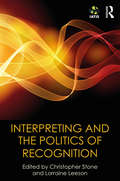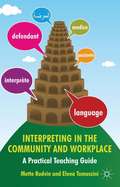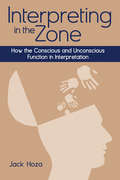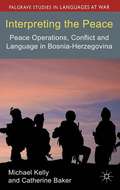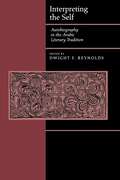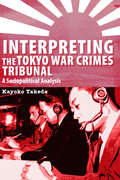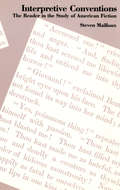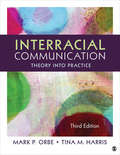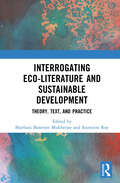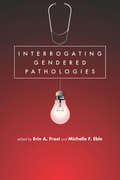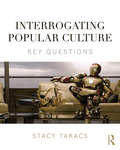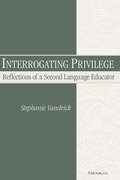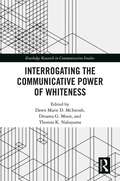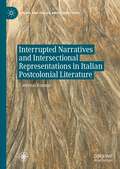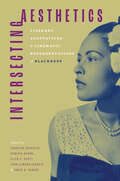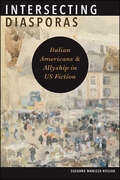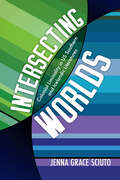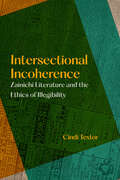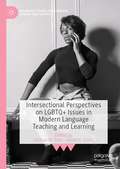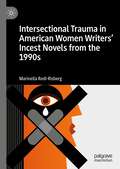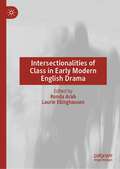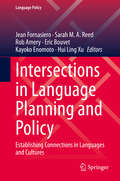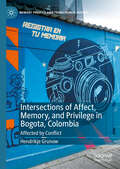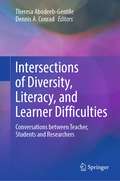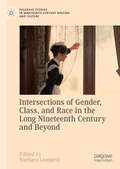- Table View
- List View
Interpreting and the Politics of Recognition: The IATIS Yearbook (The IATIS Yearbook)
by Christopher Stone Lorraine LeesonInterpreting and the Politics of Recognition investigates the historical, ethical and professional dimensions of this, arguably, most widespread form of intercultural communication. Covering key topics from colonialism to representation, ethics and power, it looks at the different linguistic modalities (signed and spoken) used within communities to investigate equality of citizens. The contributors include leading authorities in their fields and use a wide spread of examples from a variety of disparate cultures – including deaf and ethnic minority groups. With eight chapters presented in three thematic sections and a foreword by Michael Cronin setting the book in its wider context, this volume will be of interest to practising interpreters, researchers and advanced students in the areas of Interpreting Studies, Translation Studies, and Linguistics and Communication Studies. Additional resources for Translation and Interpreting Studies are available on the Routledge Translation Studies Portal: http://cw.routledge.com/textbooks/translationstudies.
Interpreting in the Community and Workplace
by Mette Rudvin Elena TomassiniAn innovative and comprehensive guide that can be applied to a wide range of dialogue settings this educational tool for trainers in all fields of dialogue interpreting addresses not only the two key areas of Community- and Public Service Interpreting, the legal and health sectors, but also business interpreting.
Interpreting in the Zone: How the Conscious and Unconscious Function in Interpretation
by Jack HozaSuccessful interpretation can feel seamless, an intuitive and efficient translation of meaning from one signed or spoken language to another. Yet the process of interpretation is actually quite complex and relies upon myriad components ranging from preparation to experience to honed judgment. Interpreting in the zone, instinctively and confidently, is an energizing, encompassing experience that results in great satisfaction and top performance--but what does it take to get there? Jack Hoza's newest research examines the components that enable interpreters to perform successfully, looking at literature in interpretation, cognitive science, education, psychology, and neuroscience, as well as reviewing the results of two qualitative studies he conducted. He seeks to uncover what it means to interpret in the zone by understanding exactly how the brain works in interpretation scenarios. He explores a range of dichotomies that influence interpretation outcomes, such as: Intuition vs. rational thought Left brain vs. right brain Explicit vs. implicit learning Novice vs. master Spoken vs. signed languages Emotion vs. reasoning Cognitive processes such as perception, short-term memory, and reflexivity are strong factors in driving successful interpretation and are explored along with habits, behaviors, and learned strategies that can help or hinder interpretation skills. Hoza also considers the importance of professional development and collaboration with other practitioners in order to continually hone expertise. Interpreting in the Zone shows that cognitive research can help us better understand the intricacies of the interpreting process and has implications for how to approach the interpreting task. This resource will be of value to both the interpreter-in-training as well as the seasoned practitioner.
Interpreting the Peace
by Michael Kelly Catherine BakerAnalysing the issues of language that faced international forces carrying out peace operations in Bosnia-Herzegovina in the 1990s, this book examines how differences of language were an integral part of the conflicts in the country and in what way the multinational UN and NATO forces faced their own problems of communication and language support.
Interpreting the Self: Autobiography in the Arabic Literary Tradition
by Dwight F. ReynoldAutobiography is a literary genre which Western scholarship has ascribed mostly to Europe and the West. Countering this assessment and presenting many little-known texts, this comprehensive work demonstrates the existence of a flourishing tradition in Arabic autobiography. Interpreting the Self discusses nearly one hundred Arabic autobiographical texts and presents thirteen selections in translation. The authors of these autobiographies represent an astonishing variety of geographical areas, occupations, and religious affiliations. This pioneering study explores the origins, historical development, and distinctive characteristics of autobiography in the Arabic tradition, drawing from texts written between the ninth and nineteenth centuries c.e. This volume consists of two parts: a general study rethinking the place of autobiography in the Arabic tradition, and the translated texts. Part one demonstrates that there are far more Arabic autobiographical texts than previously recognized by modern scholars and shows that these texts represent an established and—especially in the Middle Ages—well-known category of literary production. The thirteen translated texts in part two are drawn from the full one-thousand-year period covered by this survey and represent a variety of styles. Each text is preceded by a brief introduction guiding the reader to specific features in the text and providing general background information about the author. The volume also contains an annotated bibliography of 130 premodern Arabic autobiographical texts.In addition to presenting much little-known material, this volume revisits current understandings of autobiographical writing and helps create an important cross-cultural comparative framework for studying the genre.
Interpreting the Tokyo War Crimes Tribunal: A Sociopolitical Analysis (Perspectives on Translation)
by Kayoko TakedaIn order to ensure its absolute authority, the Tokyo War Crimes Tribunal (1946–1948), the Japanese counterpart of the Nuremberg Trial, adopted a three-tier structure for its interpreting: Japanese nationals interpreted the proceedings, second-generation Japanese-Americans monitored the interpreting, and Caucasian U.S. military officers arbitrated the disputes. The first extensive study on the subject in English, this book explores the historical and political contexts of the trial as well as the social and cultural backgrounds of the linguists through trial transcripts in English and Japanese, archival documents and recordings, and interviews with those who were involved in the interpreting. In addition to a detailed account of the interpreting, the book examines the reasons for the three-tier system, how the interpreting procedures were established over the course of the trial, and the unique difficulties faced by the Japanese-American monitors. This original case study of the Tokyo War Crimes Tribunal illuminates how complex issues such as trust, power, control and race affect interpreting at international tribunals in times of conflict.
Interpretive Conventions: The Reader in the Study of American Fiction
by Steven MaillouxIn Interpretive Conventions, Steven Mailloux provides a general introduction to reader-response criticism while developing his own specific reader-oriented approach to literature. He examines five influential theories of the reading process—those of Stanley Fish, Jonathan Culler, Wolfgang Iser, Norman Holland, and David Bleich. He goes on to argue the need for a more comprehensive reader-response criticism based on a consistent social model of reading. He develops such a reading model and also discusses American textual editing and literary history.
Interracial Communication: Theory Into Practice
by Mark P. Orbe Tina M. HarrisInterracial Communication: Theory Into Practice, Third Edition, by Mark P. Orbe and Tina M. Harris, guides readers in applying the contributions of recent communication theory to improving everyday communication among the races. The authors offer a comprehensive, practical foundation for dialogue on interracial communication, as well as a resource that stimulates thinking and encourages readers to become active participants in dialogue across racial barriers. Part I provides a foundation for studying interracial communication and includes chapters on the history of race and racial categories, the importance of language, the development of racial and cultural identities, and current and classical theoretical approaches. Part II applies this information to interracial communication practices in specific, everyday contexts, including friendships, romantic relationships, the mass media, and organizational, public, and group settings. This Third Edition includes the latest data, new research studies and examples, all-new photos, and important new topics.
Interrogating Eco-Literature and Sustainable Development: Theory, Text, and Practice
by Sharbani Banerjee Mukherjee and Soumitra RoyThis book examines the issues of ecological crisis and sustainable development through critical reading of literary texts. By analysing writings of Rabindranath Tagore, Amitav Ghosh, Gerard Manley Hopkins, Hannah Arendt, and Lawrence Buell, it discusses themes like oriental representations of ecological consciousness; environmental evocations; misogyny and its postmodern creations; tracing nature’s footprints in English literature; statelessness and consequent environmental refugees; ecocriticism and comics; and, absolute trust in the goodness of the earth. The volume argues that within the ambit of debates between ecological threats and socio-economic concerns, culture plays a vital role particularly in relation to parameters such as identity and engagement, memory and projection, gender and generations, inquiry and learning, wellbeing and health. This book will be of interest to scholars and researchers of cultural studies, English literature, social anthropology, gender studies, sustainable development, environmental studies, ecological studies, development studies, and post-colonial studies.
Interrogating Gendered Pathologies
by Michelle F. Eble Erin A FrostInterrogating Gendered Pathologies points out and critiques unjust patterns of pathology. Erin A. Frost and Michelle F. Eble assemble a transdisciplinary approach from/to technologies, rhetorics, philosophies, epistemologies, and biomedical data to consider the effects of biomedicine’s gendered norms on people’s lives. Using a range of complementary and intersectional theoretical approaches, contributors ask questions about rhetoric’s role in healthcare and how it differs depending on patient embodiment and the ways nonnormative bodies are pathologized. These chapters engage common narratives about the ways in which gender in healthcare is secondary and highlights the stories of people who have battled to prioritize their own bodies through extraordinary difficulties. Employing a multiplicity of voices, the book represents a number of different perspectives on what it might look like to return health and medical data to embodied experience, to consider the effects of gendered and intersectional biomedical norms on lived realities, and to subvert the power of institutions in ways that move us toward biomedical justice. This collection contributes to the burgeoning field of health and medical rhetorics by rhetorically and theoretically intervening in what are often seen as objective and neutral decisions related to the body and to scientific and medical data about bodies. Interrogating Gendered Pathologies will be of interest to feminist scholars in the field of rhetoric and writing studies, specifically those in the rhetorics of health and medicine, as well as scholars of technical communication, feminist studies, gender studies, technoscience studies, and bioethics. Contributors: Leslie Anglesey, Mary Assad, Beth Boser, Lillian Campbell, Marleah Dean, Lori Beth De Hertogh, Leandra Hernandez, Elizabeth Horn-Walker, Caitlin Leach, Jordan Liz, Miriam Mara, Cathryn Molloy, Kerri Morris, Maria Novotny, Sage Perdue, Colleen Reilly
Interrogating Popular Culture: Key Questions
by Stacy TakacsInterrogating Popular Culture: Key Questions offers an accessible introduction to the study of popular culture, both historical and contemporary. Beginning from the assumption that cultural systems are dynamic, contradictory, and hard to pin down, Stacy Takacs explores the field through a survey of important questions, addressing: Definitions: What is popular culture? How has it developed over time? What functions does it serve? Method: What is a proper object of study? How should we analyze and interpret popular texts and practices? Influence: How does popular culture relate to social power and control? Identity and disposition: How do we relate to popular culture? How does it move and connect us? Environment: How does popular culture shape the ways we think, feel and act in the world? Illustrated with a wide variety of case studies, covering everything from medieval spectacle to reality TV, sports fandom and Youtube, Interrogating Popular Culture gives students a theoretically rich analytical toolkit for understanding the complex relationship between popular culture, identity and society.
Interrogating Privilege: Reflections of a Second Language Educator
by Stephanie VandrickInterrogating Privilege is a welcome combination of personal essays and academic research, blending theory, analysis, and narrative to explore the function and consequences of privilege in second language education. While teachers’ focus on the learning process and class goals are quite important, there is not enough attention paid to the types of privilege—or lack thereof—that individuals bring to the classroom. Through chapters that can either stand alone or be read together, with topics such as gender, age, and colonialism (the author is the daughter of missionary parents) in second language teaching, this book seeks to address the experiences of teachers, scholars, and students as “whole persons” and to observe the workings of identity and privilege in the educational setting.
Interrogating the Communicative Power of Whiteness (Routledge Research in Communication Studies)
by Thomas K. Nakayama Dawn Marie McIntosh Dreama G. MoonThe field of communication offers the study of whiteness a focus on discourse which directs its attention to the everyday experiences of whiteness through regimes of truth, embodied acts, and the deconstruction of mediated texts. This book takes an intersectional approach to whiteness studies, researching whiteness through rhetorical analysis, qualitative research, performance studies, and interpretive research. More specifically the chapters deconstruct the communicative power of whiteness in the context of the United States, but with discussion of the implications of this power internationally, by taking on relevant and current topics such as terrorism, post-colonial challenges, white fragility at the national level, the emergence of colorblind discourse as a pro-white discursive strategy, the relationship of people of color with and through whiteness, as well as multifaceted identities that intersect with whiteness, including religion, masculinity and femininity, social class, ability, and sexuality.
Interrupted Narratives and Intersectional Representations in Italian Postcolonial Literature (Italian and Italian American Studies)
by Caterina RomeoThis book argues for the importance of adopting a postcolonial perspective in analysing contemporary Italian culture and literature. Originally published in Italian in 2018 as Riscrivere la nazione: La letteratura italiana postcoloniale, this new English translation brings to light the connections between the present, the colonial past and the great historical waves of international and intranational migration. By doing so, the book shows how a sense of Italian national identity emerged, at least in part, as the result of different migrations and why there is such a strong resistance in Italy to extending the privilege of italianità, or Italianness, to those who have arrived on Italian soil in recent years. Exploring over 100 texts written by migrant and second-generation writers, the book takes an intersectional approach to understanding gender and race in Italian identity. It connects these literary and cultural contexts to the Italian colonial past, while also looking outwards to a more diffuse postcolonial condition in Europe.
Intersecting Aesthetics: Literary Adaptations and Cinematic Representations of Blackness
by Charlene Regester, Cynthia Baron, Ellen C. Scott, Terri Simone Francis, and Robin G. VanderContributions by Cynthia Baron, Elizabeth Binggeli, Kimberly Nichele Brown, Priscilla Layne, Eric Pierson, Charlene Regester, Ellen C. Scott, Tanya L. Shields, and Judith E. Smith Intersecting Aesthetics: Literary Adaptations and Cinematic Representations of Blackness illuminates cultural and material trends that shaped Black film adaptations during the twentieth century. Contributors to this collection reveal how Black literary and filmic texts are sites of negotiation between dominant and resistant perspectives. Their work ultimately explores the effects racial perspectives have on film adaptations and how race-inflected cultural norms have influenced studio and independent film depictions. Several chapters analyze how self-censorship and industry censorship affect Black writing and the adaptations of Black stories in early to mid-twentieth-century America. Using archival material, contributors demonstrate the ways commercial obstacles have led Black writers and white-dominated studios to mask Black experiences. Other chapters document instances in which Black writers and directors navigate cultural norms and material realities to realize their visions in literary works, independent films, and studio productions. Through uncovering patterns in Black film adaptations, Intersecting Aesthetics reveals themes, aesthetic strategies, and cultural dynamics that rightfully belong to accounts of film adaptation. The volume considers travelogue and autobiography sources along with the fiction of Black authors H. G. de Lisser, Richard Wright, Ann Petry, Frank Yerby, and Walter Mosley. Contributors examine independent films The Love Wanga (1936) and The Devil’s Daughter (1939); Melvin Van Peebles's first feature, The Story of a Three Day Pass (1967); and the Senegalese film Karmen Geï (2001). They also explore studio-era films In This Our Life (1942), The Foxes of Harrow (1947), Lydia Bailey (1952), The Golden Hawk (1952), and The Saracen Blade (1954) and post-studio films The Learning Tree (1969), Shaft (1971), Lady Sings the Blues (1972), and Devil in a Blue Dress (1995).
Intersecting Diasporas: Italian Americans and Allyship in US Fiction (SUNY series in Italian/American Culture)
by Suzanne Manizza RoszakIntersecting Diasporas examines literary expressions of allyship between Italian America and other diasporic communities in modern and contemporary US fiction. Rewriting the Anglo-American genre of the "Italian novel," authors like James Baldwin, Bernard Malamud, Carolina De Robertis, and Chang-rae Lee have disrupted misconceptions of Italian and Italian American identity while confronting Italians' own complicity with white racism. Likewise, Italian American authors from John Fante to Tina De Rosa have written in solidarity with Black, Chicanx, Filipinx, Jewish, Romani, and Irish diasporic communities on US shores, unsettling stereotypes and dissecting Italian America's history of flawed allyship across diasporas. Suzanne Manizza Roszak traces these gestures of literary solidarity; considers how they relate to the writers' critiques of toxic masculinity, antiqueerness, and socioeconomic injustice; and proposes interdiasporic allyship as a practice of reconciliation and healing.
Intersecting Worlds: Colonial Liminality in US Southern and Icelandic Literatures
by Jenna Grace SciutoIntersecting Worlds: Colonial Liminality in US Southern and Icelandic Literatures recalibrates readings of US southern and American writers by exploring comparable depictions of race, colonialism, Whiteness, gender, and sexuality in Icelandic literature. This book explores the liminality, ambiguity, and general unease that result when postcolonial theories are applied to both Iceland and the US South. It investigates the parallels and also the limitations to such comparisons with the labels and binaries created to represent colonial dynamics flattening the complex positionings of Iceland and the US South. Iceland, an independent nation since 1944, has a complex colonial history. As a former dependency of Denmark that endured a US military presence from 1941 to 2006, Iceland’s global positioning invites comparisons to formerly colonized spaces. At the same time, Iceland’s history and geopolitical location differ from other colonized nations, which were subject to brutal violence and dehumanizing practices. This comparative project investigates Iceland’s colonial liminality and draws connections to the colonial ambiguity of the US South, depicted as colonized by the federal government during Reconstruction and the site of the colonization of the Black population through slavery and its later iterations.Exploring the work of US southern writers, like William Faulkner, Gayl Jones, Jean Toomer, and Carson McCullers, alongside twentieth-century Icelandic novelists, including Halldór Laxness, Svava Jakobsdóttir, Guðbergur Bergsson, and Fríða Áslaug Sigurðardóttir, on both thematic and aesthetic levels reveals much about each region’s history and the complexity of colonial dynamics. Intersecting Worlds centers layers of Whiteness in both national and transnational contexts, challenges ideas of Nordic and US southern exceptionalism, and exposes the complex impacts of colonialism in the Global North and the Global South, as depicted in twentieth-century literature.
Intersectional Incoherence: Zainichi Literature and the Ethics of Illegibility (Global Korea #5)
by Cindi TextorA free ebook version of this title is available through Luminos, University of California Press's Open Access publishing program. Visit www.luminosoa.org to learn more.Intersectional Incoherence stages an encounter between the critical discourse on intersectionality and texts produced by Korean subjects of the Japanese empire and their postwar descendants in Japan, known as Zainichi Koreans. Arguing for intersectionality as a reading method rather than strictly a tool of social analysis, Cindi Textor reads moments of illegibility and incoherent language in these texts as a product of the pressures on Zainichi Koreans and their literature to represent both Korean difference from and affinity with Japan. Rejecting linguistic norms and representational imperatives of identity categories, Textor instead demands that the reader grapple with the silent, absent, illegible, or unintelligible. Engaging with the incoherent, she argues, allows for a more ethical approach to texts, subjects, and communities that resist representation within existing paradigms.
Intersectional Perspectives on LGBTQ+ Issues in Modern Language Teaching and Learning (Palgrave Studies in Language, Gender and Sexuality)
by Joshua M. Paiz James E. CodaThis edited book examines how sexuality and sexual identity intersect and interact with other identities and subjectivities – including but not limited to race, religion, gender, social class, ableness, and immigrant or refugee status – to form reinforcing webs of privilege and oppression that can have significant implications for language teaching and learning processes. The authors explore how these intersections may influence the teaching of different languages and how pedagogies can be devised to increase equitable access to language learning spaces. They seek to open the conversation on intersectional issues as they relate to sexuality and language teaching and learning, and provide a conversational space where readers can engage with the notion of intersectionality. This book will be of interest to students and scholars of applied linguistics and language education, gender and LGBTQ+ studies, and sociolinguistics, outlining possible future directions for intersectional research.
Intersectional Trauma in American Women Writers' Incest Novels from the 1990s
by Marinella Rodi-RisbergThis book explores the intersections of sexualized, gendered, and racialized traumas in five US novels about father-daughter incest from the 1990s. It examines how incest can be connected to wider past and present structural oppression and institutional abuse, and what fiction looks like that testifies against and references a historical background of slavery, poverty, settler colonialism, annexation, and immigration. Investigating the means of resistance used against attempts at silencing and denial in these texts, the book also shows how contemporary women’s novels can propose social change. Overall, this study uniquely argues that the individual trauma of incest in these texts must be understood in relation to histories of and present collective wounding against marginalized communities. By sitting at the intersections between trauma theory and US third world feminism, it allows for theory to meet literary activism.
Intersectionalities of Class in Early Modern English Drama
by Laurie Ellinghausen Ronda ArabDefining class broadly as an identity categorization based on status, wealth, family, bloodlines, and occupation, Intersectionalities of Class in Early Modern English Drama e xplores class as a complicated, contingent phenomenon modified by a wider range of social categories apart from those defining terms, including, but not limited to, race, gender, religion, and sexuality. This collection of essays – featuring a range of international contributors – explores a broad range of questions about the intersectional factors influencing class status in early modern England, including how cultural behaviors and non-class social categories affected status and social mobility, in what ways hegemonies of elite prerogatives could be disrupted or entrenched by the myriad of intersectional factors that informed social identity, and how class position informed the embodied experience and expression of affect, gender, sexuality, and race as well as relationships to place, space, land, and the natural and civic worlds.
Intersections in Language Planning and Policy: Establishing Connections in Languages and Cultures (Language Policy #23)
by Hui Ling Xu Jean Fornasiero Sarah M. A. Reed Rob Amery Eric Bouvet Kayoko EnomotoThis volume encompasses the range of issues encountered by language scholars who teach and research in departments of languages and cultures within the higher education system, predominantly in Australia, but touching other universities worldwide. Related studies on language planning, methodology or pedagogy have focused on one or more of these same issues, but rarely on their totality. Intersections as a metaphor running discreetly through the essays in this volume, connects them all to a lived reality. The field of languages and cultures, as it is practised and reflected upon in Australian universities, is essentially an interdisciplinary and interconnecting space - one in which linguistic and disciplinary diversities meet and join forces, rather than collide or disperse along different pathways. The international and local studies featured here focus on language planning, new pedagogies and language reclamation and link to meeting points and commonalities. They show that language scholars are increasingly finding themselves on common ground as they tackle issues of policy and practice affecting their field, whether within their institutions, within the tertiary system, or within the framework of government policy.
Intersections of Affect, Memory, and Privilege in Bogota, Colombia: Affected by Conflict (Memory Politics and Transitional Justice)
by Hendrikje GrunowThis book explores the intersections of affect, memory and privilege among Bogota’s upper middle class. Combining approaches from memory studies, anthropology, feminist and affect theory, this work is concerned with the implications for the present and potential futures contained in affective encounters. It is structured along four affects describing the social, spatial, historical and political aspects of ‘being affected’ by the Colombian conflict. After showing how the Colombian conflict is rooted in specific affective relationships to land, disappointment and crushed hopes in the context of various peace negotiations are portrayed as the central experiences nurturing a sense of a doubling or re-experiencing of past emotions. Then, a specifically upper-middle class emotional habitus and its implication for the social connections to people more directly affected by the conflict are outlined, and peace as an upper middle-class affect is revealed as a privilege not everyone deserves.
Intersections of Diversity, Literacy, and Learner Difficulties: Conversations between Teacher, Students and Researchers
by Dennis A. Conrad Theresa Abodeeb-GentileThis book invites readers to challenge, corroborate, and add to the discourse on more inclusive pedagogical practice. Presenting theoretically and empirically informed research, it highlights potential considerations regarding the intersections of diversity, literacy, and learner difficulties. These three areas provide a stage where opposing paradigms often pose challenges for educators and create unnecessary barriers to providing the best education for all learners. These barriers might reveal how students are positioned through a deficit lens rather than one that recognizes individual differences and how these learner differences sometimes result in labels or put students at increased risk of encountering difficulties. The contributing authors’ goals are to start and sustain a conversation that examines these perspectives and to offer counter-narratives to the deficit lens by recognizing that individual difference does not need to be a barrier to educational access. By examining opportunities for more inclusive educational success, this book encourages discourse among key stakeholders; further, it goes beyond problematizing to offer new avenues for optimal learning and inclusive pedagogy across multiple contexts.
Intersections of Gender, Class, and Race in the Long Nineteenth Century and Beyond (Palgrave Studies In Nineteenth-century Writing And Culture )
by Barbara LeonardiThis book explores the intersections of gender with class and race in the construction of national and imperial ideologies and their fluid transformation from the Romantic to the Victorian period and beyond, exposing how these cultural constructions are deeply entangled with the family metaphor. For example, by examining the re-signification of the “angel in the house” and the deviant woman in the context of unstable or contingent masculinities and across discourses of class and nation, the volume contributes to a more nuanced understanding of British cultural constructions in the long nineteenth century. The central idea is to unearth the historical roots of the family metaphor in the construction of national and imperial ideologies, and to uncover the interests served by its specific discursive formation. The book explores both male and female stereotypes, enabling a more perceptive comparison, enriched with a nuanced reflection on the construction and social function of class.
